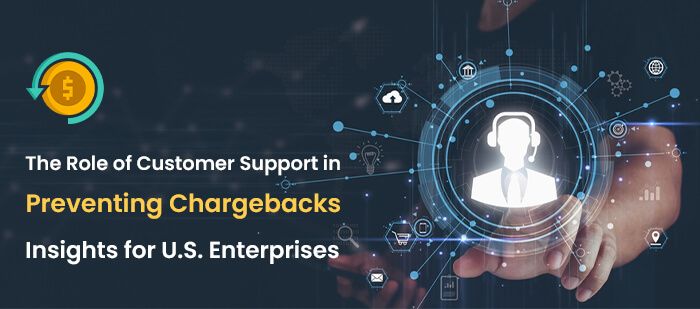
In today’s competitive market, U.S. businesses face the growing challenge of chargebacks, which can significantly impact their bottom line. Effective chargeback mitigation strategies are essential for maintaining financial health and customer trust. One crucial yet often overlooked aspect of this process is the role of customer support.
By enhancing customer service to reduce chargebacks, companies can address issues before they escalate into disputes. Proactive communication, timely responses to inquiries, and personalized service can turn potential conflicts into opportunities for resolution.
When customers feel valued and understood, they are less likely to initiate chargebacks, leading to improved retention rates and customer loyalty. Investing in robust customer support not only helps prevent chargebacks but also fosters a positive brand image, ultimately benefiting the entire enterprise.
Understanding the Chargeback Process
The chargeback process begins when a customer disputes a transaction with their bank, rather than contacting the merchant directly. This often occurs due to issues such as unauthorized transactions, unrecognized charges, or dissatisfaction with the product or service received. Once a dispute is initiated, the bank investigates the claim and temporarily credits the customer’s account while seeking further information from the merchant.
Merchants receive a chargeback notification and must respond with compelling evidence to contest the claim. This evidence can include transaction records, shipping details, communication logs, and any other documentation that supports the validity of the charge. If the bank finds the merchant’s evidence satisfactory, the chargeback is reversed, and the funds are returned to the merchant. However, if the evidence is insufficient or the customer’s claim is upheld, the chargeback is finalized, and the merchant loses the disputed amount.
Additionally, chargebacks come with fees and can impact a merchant’s reputation and relationships with payment processors. High chargeback ratios may lead to increased processing fees or even the loss of merchant accounts, making it imperative for U.S. businesses to understand and effectively manage the chargeback process.
Some Related Blogs
- Reducing Chargebacks for U.S. Subscription-Based Services
- Navigating Chargeback Fees: Essential Information for U.S. Enterprises
- Proven Chargeback Representment Techniques for U.S. Businesses
- How to Establish a Strong Chargeback Prevention Strategy for U.S. E-Commerce Firms
Chargebacks can arise from a variety of causes, many of which are preventable with proper oversight and customer service. One common cause is fraud, where unauthorized transactions are made using stolen credit card information.
Another frequent issue is customer dissatisfaction, often due to unmet expectations regarding product quality, shipping times, or customer service interactions. Billing errors, such as incorrect amounts or duplicate charges, can also lead to chargebacks. Additionally, poor communication or misunderstandings about return policies and warranty terms often result in disputes.
Technical glitches during the checkout process, like double billing or failed transactions, can also contribute to the problem. Lastly, some customers may exploit the chargeback process to obtain free goods or services, a practice known as “friendly fraud.” Identifying and understanding these common causes can help U.S. businesses implement more effective chargeback mitigation strategies.
Role of Customer Support in Chargeback Mitigation
Customer support plays a pivotal role in chargeback mitigation by addressing potential issues before they evolve into formal disputes. Effective communication is key; support teams should be readily available and trained to handle various customer concerns, from billing inquiries to product-related issues.
By promptly addressing customer complaints and providing clear explanations or solutions, businesses can prevent misunderstandings that often lead to chargebacks. Additionally, support teams should proactively follow up with customers after a purchase to ensure satisfaction and address any emerging issues. Implementing a robust ticketing system can help track and resolve complaints efficiently, reducing the likelihood of chargebacks.
Personalized service also fosters a positive customer experience, making customers feel valued and less inclined to dispute charges. Integrating feedback loops from support interactions can further enhance service quality and preempt future chargebacks. Ultimately, a well-trained, responsive, and empathetic customer support team is a critical asset in the ongoing effort to minimize chargebacks and maintain customer trust.
Training Customer Support Teams for Chargeback Prevention
Training customer support teams for chargeback prevention involves a multifaceted approach that equips representatives with the skills and knowledge to handle disputes effectively. Start with comprehensive education on the chargeback process, including common causes and the financial impact on the business.
Equip your team with problem-solving skills and techniques for de-escalating tense interactions. Role-playing scenarios can be particularly useful for practicing responses to various customer complaints. Emphasize the importance of accurate record-keeping and documentation, as these are crucial when contesting chargebacks.
![]()
Email us anytime!
Email customer service 24/7
![]()
Call us anytime!
Reach customer care 24/7 at +1 (888) 901-8653
Teach your team how to identify potential fraud indicators and handle suspicious transactions appropriately. Additionally, training should cover clear communication strategies, ensuring that representatives can explain policies and procedures in a way that customers understand.
Continuous education is also vital; offer regular workshops and updates on new chargeback trends and evolving best practices. Leveraging customer feedback to refine training programs ensures that your team remains adaptive and responsive to customer needs. By investing in thorough and ongoing training, U.S. businesses can empower their support teams to mitigate chargebacks effectively, ultimately safeguarding their revenue and reputation.
Leveraging Technology to Enhance Customer Service
Leveraging technology can significantly enhance customer service, playing a crucial role in chargeback prevention. Implementing advanced CRM systems allows support teams to access customer histories and interactions quickly, enabling personalized and efficient service.
AI-driven chatbots can handle routine inquiries 24/7, freeing up human agents to tackle more complex issues. These chatbots can also preempt potential problems by recognizing patterns in customer behavior and providing proactive solutions.
Additionally, integrating machine learning algorithms can help identify suspicious transactions in real-time, allowing businesses to take preventive actions before fraud occurs. Utilizing data analytics tools enables companies to gain insights into common customer pain points and adjust their processes accordingly.
Omnichannel support platforms ensure seamless communication across various channels, such as email, phone, social media, and live chat, providing customers with multiple avenues to resolve their issues swiftly. Automating ticketing systems can streamline the resolution process, ensuring timely follow-ups and reducing the likelihood of disputes escalating into chargebacks.
By embracing these technological advancements, U.S. businesses can create a more responsive and efficient customer support environment, ultimately reducing chargebacks and fostering stronger customer relationships.


